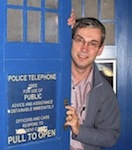GAM 2012 Blog
|
April 21 By Robert Hollow |
Back to the GAM Blog | 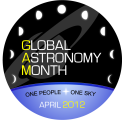 |
| I'm currently in Cairns in tropical north Queensland where I have just finished running a two day weekend workshop for local high school science teachers on the effective teaching of astronomy. Why Cairns? |
||
Well, come November this year Cairns will experience one of the most amazing astronomical experiences, a total solar eclipse. So why run a teacher workshop on astronomy and why are teachers willing to give up their own time to learn more about it? They are going to play a vital role in communicating the excitement, science and safe viewing for this even to their students and through them to many parents and other community members.
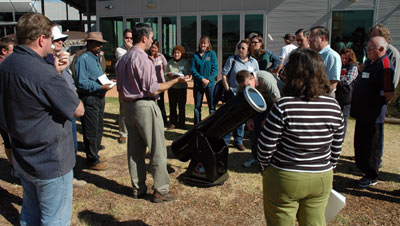
In my experience as a former high school teacher and now a professional astronomy educator I have met many enthusiastic and hard working teachers possessing a wealth of knowledge, expertise and the ability to inspire their students. Teachers are busy professionals responding to an ever-increasing set of demands on their time. Whilst they are extremely knowledgable about their own subject areas it is a fact that most teachers have to deliver a broad curriculum so often have to teach content and topics that they feel less comfortable about. Astronomy generally falls into this category. Few science teachers, let alone primary teachers who have to teach all subjects, have formal training in astronomy or in the effective teaching of astronomical concepts. Many are mindful of this though and actively seek out ways to improve their skills.
So where can they go for help? Fortunately there is now widespread recognition of the need to support teachers by both professional and amateur astronomy groups. A key part of my work at CSIRO Astronomy and Space Science is working with teachers across Australia. As a national facility we recognise the need and value of working with a range of educators to support them with their work. As much as I enjoy working with individual students and class groups I can have more impact by targeting teachers. Each teacher that I or a colleague work with can then potentially have an influence on hundreds of students or thousands over their career. They can also work with their teaching colleagues, passing on new ideas, techniques and resources they acquire at workshops.
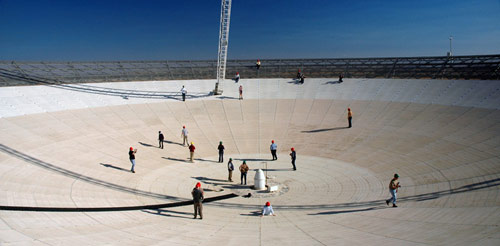
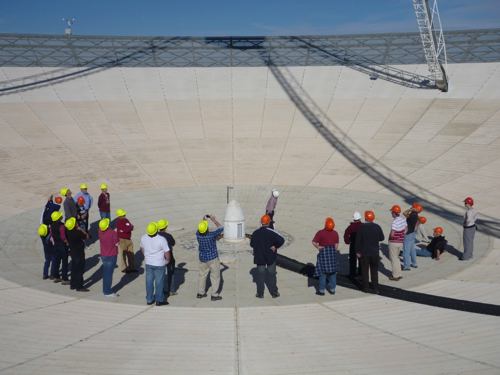
This pyramid-like approach was one of the inspirations behind the Galileo Teacher Training Program (GTTP), a legacy cornerstone project from the 2009 International Year of Astronomy. An international program, accredited trainers now run teacher workshops in many countries using a diverse range of vetted resources. Some of the teacher participants in turn have gone on to run their own local workshops or sessions at other teacher conferences. As the national coordinator for the scheme in Australia one of the most gratifying aspects of running events such as GTTP workshops is inspiring teachers to have the confidence to further develop their skills and go on and then support their own colleagues. I'm constantly impressed by the innovative ideas and quality teaching materials and programs that participating teachers develop post-workshop. My role is an initiator and then someone to act as a source of advice or a second opinion. They have the tough, challenging but rewarding role of teaching and inspiring the next generation. It is in all our interests that the children of today are a scientifically literate public of tomorrow.
Astronomy is a great context for inspiring children in science and for teaching many scientific concepts. Training the teachers to better achieve this is an ongoing need. Professional astronomical organisations can act as sources of reliable information, teacher and/or student mentors and help in the development and delivery of innovative programs and resources. Amateur astronomers also have a useful role to play. Many amateur societies are often best placed within local communities to provide expertise, equipment and enthusiasm for viewing nights for schools. Teachers who may otherwise be reluctant to run such an event on their own or lack the telescopes can work with keen amateurs to the benefit of both groups.
As Global Astronomy Month draws to a close it is worth us all reflecting on how we can contribute to promoting an understanding of astronomy specifically and science generally in the broader community. We should particularly consider how to support our local teachers and schools. For myself, I'm looking forward to an annual highlight, my upcoming three-day teacher workshop at the iconic Parkes Observatory, home of "the Dish" in May with teachers from across Australia. I can't wait.
|
|
"Robert Hollow is the Education Officer for CISIRO Astronomy and Space Science. He runs teacher training workshops in Astronomy across Australia and coordinates the innovative "[email protected]" program allowing high school students the opportunity to observe pulsars with the iconic Parkes 64m radio telescope remotely over the internet |







